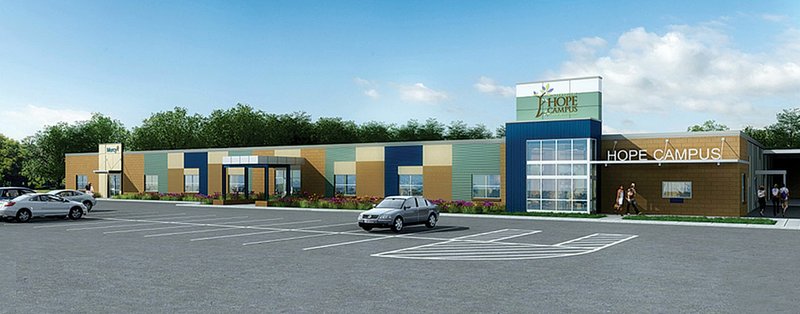FORT SMITH -- More than six years after the idea surfaced, construction has begun on a social-services campus south of downtown to help homeless and low-income people turn around their lives.
The Old Fort Homeless Coalition has raised nearly $4 million to create the Riverview Hope Campus from 35,000 square feet of a 127,000-square-foot former Riverside Furniture factory building at 301 S. E St. along the Poteau River.
The purpose of the campus is to consolidate services in one location to help homeless people develop skills or receive help aimed at breaking the cycle of homelessness.
The campus is scheduled to open next fall, Fort Smith Homeless Director Debbie Everly said.
The price tag includes the purchase of the building, architecture and engineering fees, furniture, fixtures, equipment, security system and a 5 percent contingency fund, Everly said.
The coalition is still short of having all the money for the project, but it had enough to begin the construction Thursday, she said. Fundraising efforts continue.
One fundraising event will be an appearance Nov. 10 in Fort Smith by Ron Hall, author of the best-seller Same Kind of Different as Me, a story about his relationship with a homeless man.
The book is being made into a movie featuring Renee Zellweger, Greg Kinnear, Jon Voight and Djimon Hounsou, and will be released early next year.
Everly said Fort Smith police, who have regular contact with the city's homeless, estimate there are 150-180 people living on the streets.
"This is a new beginning for the low-income and homeless in our area," Greg Pair, president of the Riverview Hope Campus board of directors, said in a news release.
The first phase of the campus will be a 75-bed low-demand shelter that will admit anyone as long as they don't have alcohol or drugs on them and are not violent. Day services will accommodate up to 200 people.
People at the shelter will have access to sleeping mats, storage for their possessions, a kennel for pets, food, a shower, bathroom, laundry and a barber.
They also will be offered other services from the community. Mercy Hospital will put $350,000 into a clinic on the campus, and the Fort Smith School District will offer adult education classes. Others groups will have space to offer mental-health services, job training, dental care, a library and a worship center.
Future phases include development of 12 single-room occupancy apartments and a 25-bed unit, called Safe Haven, for the chronically mentally ill.
The coalition will partner with several agencies and groups on the campus. Among them are Mercy Hospital, Fort Smith Public Schools Adult Education, Western Arkansas Counseling and Guidance Center, Valley Behavioral Health System, Fort Smith Housing Authority and the U.S. Veterans Affairs Department.
"By providing a place to consolidate the services of the existing non-profits and charities, we will be able to provide more than just the acute needs of food or shelter," Jeremy May, vice president of the campus board, said in the release. "We'll be able to identify the root cause of each individual's need, which is what we ultimately aim to address."
The coalition has raised money for the campus from several sources, public and private.
Most recently, the J.E. and L.E. Mabee Foundation in Tulsa, Okla., awarded a $500,000 challenge grant to the coalition in February. Everly said the coalition is $50,000 short of matching the challenge goal.
The campus also has received a $500,000 grant from the Federal Home Loan Bank in Dallas; more than $786,000 in private gifts and foundations; $445,000 in grants from the Arkansas Development Finance Authority; a $260,739 federal Housing and Urban Development emergency solution grant; a block fund grant from the city to cover the $603,441 purchase price of the building; cash pledges and in-kind donations; and a $224,363 low-interest loan from the Fort Smith Housing Authority to allow for the start of construction, said Mitch Minnick, Fort Smith Housing Authority executive director.

